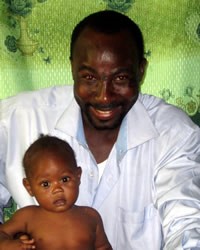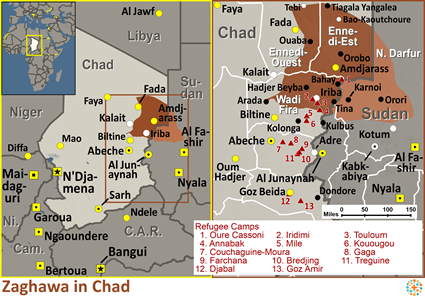The Zaghawa (also spelled Zakhawa) are an ethnic group in eastern Chad and western Sudan, including Darfur. The Kanemite royal history, the Girgam, refers to the Zaghawa people as the Duguwa. Today, Zaghawa refer to themselves as the Beri, while the name "Zaghawa" came from the nearby Arab peoples and became better known. They have their own language, which is also called Zaghawa, and the breed of sheep that they herd is called Zaghawa by the Arabs.
Zaghawa are first mentioned in Arabic language texts. The Arab geographer al-Ya'qubi, in a description written around 890 spoke of them as the "Zaghawa who live in a place called Kanem," and proceeded to list a string of other kingdoms under Zaghawa rule which cannot be identified for sure but make it clear that they had some sort of hegemony over most of the smaller complex societies that stretched from at least Lake Chad to the Christian Nile valley kingdoms of Nubia, Makuria and Alwa. Ya'qubi also mentioned that the Zaghawa sold slaves to the north. Al-Ya'qubi and other early accounts make the Zaghawa to be nomadic and it appears that their hegemony over this region was not unlike the sort of loose rule that nomadic cultures sometimes exercised over settled populations elsewhere in the world.
Following the rise of Darfur and Kanem, the Zaghawa appear to have controlled only desert areas and ceased to be a major regional power.
While they are not very powerful in Sudan, they politically dominate Chad. The Chadian Zaghawa are among the richest and most influential people of Chad. However, in Sudan, the Zaghawa are caught up in the Darfur crisis, and have suffered much loss from the troubles there. The Zaghawa of Sudan are among the peoples living in the refugee camps in Darfur and eastern Chad.
Some are semi-nomadic and obtain much of their livelihood through herding cattle, camels and sheep and harvesting wild grains.
As a result of Tijani Muslim missionaries from West Africa who were traveling through their area to make the pilgrimage to Mecca, the leadership converted to Islam. In the 1940s, the Zaghawa began to turn to Islam from Animism en masse. In Darfur, the Zaghawa are well-known for their piety. Due to the fighting in Darfur, where they are targeted by local Arab militia due to their ethnic heritage, 100,000 have become refugees across the border in Chad. A Zaghawa tribesman named Daoud Hari wrote a memoir about Darfur called The Translator, which spread knowledge about the atrocities in Darfur.
In 2000 an alphabet based on livestock brands was created for the Zaghawa language. This can be the beginning of work among them. They need consistent safety in this part of Africa that often blows up into warfare.
Ask the Lord of the harvest to send forth laborers into central Africa to work among the Zaghawa.
Ask God to create a hunger within the hearts of the Zaghawa to know the one who is the truth.
Pray for Zaghawa elders and family leaders to have dreams of the risen Christt.
Ask the Lord to bring forth vibrant churches among the Zaghawa for the glory of his name.
Scripture Prayers for the Zaghawa in Chad.
1. Zaghawa survey, SIL Chad. 2004.
2. a b [1] de Waal, Alex, "Darfur's deep grievances defy all hopes for an easy solution", opinion article, The Observer of London, July 25, 2004, accessed September 4, 2007
3. See http://goo.gl/nbN87
4. Se
| Profile Source: Joshua Project |

























